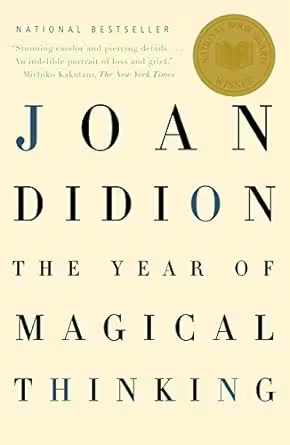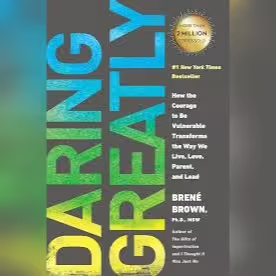This book review of The Year of Magical Thinking by Joan Didion is part of my Amazon 100 Books to Read in a Lifetime Reading Quest.
This post pay contain affiliate links, which means that I may receive a commission if you make a purchase using these links. As an Amazon Associate I earn from qualifying purchases. Thanks for helping to support the content on this site.

The Year of Magical Thinking
- Author: Joan Didion
- Genre: Non-Fiction, Memoirs
- Publisher: Vintage
- Pages: 227 Pages, Paperback
Life changes in the instant. The ordinary instant.
Joan Didion, The Year of Magical Thinking
I’ll just put the bottom line up front: I did not like this book at all. Not because the writing was bad. Certainly it wasn’t. Joan Didion was a masterful writer whose language in this book is near perfection at times. And this in no way is meant to diminish her overall accomplishments as a legendary author and journalist. And obviously, my strong reaction to this book does not mean that you should not read this book or any of her work. There are many for whom Didion’s personal story resonates heavily. And to be fair, much of the grief aspects resonated heavily with me. The sense of “what else can go wrong” when you are suffering, that life can pile on, is extremely relatable. I had really high hopes with this book. I’ve suffered with significant grief from similar loses in the past few years. I went into this hoping for a type of kinship and relatability. But I just could not find a personal relatability to Didion’s general life and the privilege that comes with her celebrity and wealth status. And that was unfortunately a hurdle too great for me to overcome
Book Summary
The Year of Magical Thinking is Joan Didion’s deeply personal memoir about the aftermath of her husband John’s sudden death. It also has added reflections on the simultaneous illness of their daughter, Quintana. The book follows Didion through a turbulent year as she navigates grief and the trauma of losing her partner. It’s a story of memory, pain, and a certain “magical thinking” Didion finds herself retreating into, where she imagines that maybe she can somehow bring John back or keep Quintana safe if she just thinks the right thoughts or avoids certain things. Didion’s writing explores her inner world in detail, offering a view into the complex ways grief can manifest.
My Review
Privilege and Perspective
To me, this book was hard to connect with—and not just because of its raw look at grief. Didion’s life is filled with luxuries and social privileges, from private jets to high-profile friends to almost unlimited medical options, all of which feel worlds apart from the average reader’s experience. It’s tough to feel sympathy in the same way for someone who can, in a crisis, call up world-renowned doctors or take a spontaneous flight. One of the more jarring moments was reading about her ability to access specialists right away, almost as if the universe was at her beck and call. This luxury is completely foreign to most people going through loss.
In one passage, Didion notes, “I remember thinking that I needed to discuss this with John.” That moment of misplaced hope is relatable, sure, but the world she lives in feels so distant from anything most people would experience. For most readers, grief happens without the insulation of privilege—without a personal doctor or a social network of elites to lean on.
A Detached View of Grief
Didion’s writing style is deliberate and often detached. I imagine this was her way of processing trauma, and it may resonate with some who appreciate her let’s say, clinical, approach. But for me, her voice felt distant and, at times, self-indulgent. It felt like a detached impersonal observer not participating in the actual story being told, rather than a deeply personal and raw story. The cool, distant tone just made it too hard for me to connect. I kept looking for something with more heart, something raw, but instead, I found myself feeling like there was an impenetrable wall between us.
There’s one point in the book where she mentions her habit of obsessively “analyzing the randomness” of life. It just sounded more like a philosophical exercise than some genuine recounting of grief and heartbreak. It was as though she was too busy dissecting her experience to actually feel it, and that sense of detachment made it difficult for me to connect with her. I know she was in pain, but her privilege made it hard to empathize fully.
Unrealistic “Magical Thinking”
Didion’s “magical thinking” feels less like the relatable mental loops most of us fall into and more like a product of her unique life. She believes she can control the uncontrollable, an understandable grief reaction, but again, she has the means to act on it in ways most people don’t. There’s a moment where she insists on keeping her husband’s shoes because she might need them for him someday. This quirk could have been touching, a relatable expression of not wanting to let go. Instead, it felt strangely artificial, like another detail she was observing rather than truly feeling. For someone without access to so many resources, “magical thinking” might look a lot different—more desperate, less detached.
In the end, her brand of “magical thinking” seems removed from reality because she doesn’t have to face the same harsh limits others do. Didion could entertain ideas that most people wouldn’t have the privilege to indulge in, and that makes the memoir feel, at times, almost surreal.
Missed Opportunities for Relatability
If the book had attempted to acknowledge the obvious privilege present in Didion’s life, it might have felt more grounded. But there’s no real mention of it, and that absence is glaring. Didion doesn’t recognize the divide between her experience and that of someone without her means, which left me feeling like she didn’t realize how isolated her story would make readers feel. At no point does she nod to the fact that losing a loved one is not an equal experience across social and economic boundaries.
Many people might rely on community support, counseling, or group therapy when facing grief, if they can afford it. Didion, on the other hand, has a Rolodex of top doctors and influential friends. It’s a reminder that, no matter your status, no one is immune to grief. However, I think the book would have felt more genuine if she had acknowledged her unique resources. Her process and options aren’t available to most people. As someone who has desperately tried to get members of my family medical assistance and struggled with a healthcare system as an average person that doesn’t seem fair at all, this one just didn’t hit anywhere close to the mark.
Parting Thoughts
The Year of Magical Thinking may resonate with those who appreciate Joan Didion’s sharp, precise writing style. Her reflections on grief could hit home for those who have similar resources or can empathize with her perspective. But if you’re coming from a different world, as I was, this memoir may feel uncomfortably privileged and difficult to connect with on a personal level. For me, Didion’s portrayal of grief missed the mark, caught up in a world I couldn’t relate to. The story had potential, but the book’s narrow, privileged focus made it feel like a missed opportunity to speak to a wider audience.
Other Books You Might Enjoy
About the Author
Joan Didion was a famous American writer known for her essays, novels, and memoirs. She was born in Sacramento, California, in 1934 and studied English at the University of California, Berkeley. Didion’s career began when she won a Vogue magazine writing contest, leading her to work as an editor and writer. Her first book, Run River, was published in 1963. She gained wide acclaim with her essay collections Slouching Towards Bethlehem (1968) and The White Album (1979), which captured the cultural shifts of the 1960s and 1970s. Didion received the National Book Award for The Year of Magical Thinking (2005), a memoir about grief after losing her husband. Didion also won the National Medal of Arts in 2013 for her contributions to American literature. Her work continues to inspire writers and readers around the world.
Reading Details
Start date: October 1, 2024
Finish date: October 2, 2024


